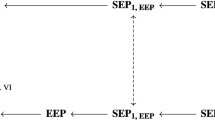Abstract
The paper tries to develop Bartels’s modern essentialism as a structural-role theory of identity for spacetime points. I adopt Hoefer’s idea of denying primitive identity for this theory and apply it to GTR and prerelativistic physics to find different versions of essentialism and different definitions of determinism which are coherent with them. I also try to argue that modified essentialism helps us to refute objections raised against essentialism and offers us the best understanding of prerelativistic and relativistic theories.
Similar content being viewed by others
References
R.M. Adams (1979) ArticleTitle‘Primitive Thisness and Primitive Identity’ Journal of Philosophy 76 5–26
H.G. Aleksander (Eds) (1984) The Leibniz-Clarke Correspondence Barnes and Noble New York
A. Bartels (1996) ArticleTitle‘Modern Essentialism and the Problem of Individuation of Spacetime Points’ Erkenntnis 45 25–43 Occurrence Handle10.1007/BF00226369
M. Black (1952) ArticleTitle‘The Identity of Indiscernibles’ Mind 242 153–164
J. Butterfield (1989) ArticleTitle‘The Hole Truth’ British Journal for the Philosophy of Science 40 1–28
M. Demaret M. Heller D. Lambert (1997) ArticleTitle‘Local and Global Properties of the World’ Foundations of Science 2 137–176 Occurrence Handle10.1023/A:1009691614005
J. Earman (1986a) ArticleTitle‘Why Space Is Not a Substance (at Least Not to First Degree)’ Pacific Philosophical Quartely 67 225–244
J. Earman (1986b) A Primer on Determinism D. Reidel Dordrecht
J. Earman (1989) World Enough and Space-Time MIT Press Cambridge, MA
J. Earman J. Norton (1987) ArticleTitle‘What Price Space-Time Substantivalism? The Hole Story’ British Journal for the Philosophy of Science 38 515–525
A. Einstein (1961) Relativity The special and General Theory Crown Publishers New York
M. Friedman (1983) Foundation of Space-Time Theories Princeton University Press Princeton
R. Geroch (1972) ArticleTitle‘Einstein Algebras’ Communication in Mathematical Physics 26 271–279 Occurrence Handle10.1007/BF01645521
J. Gołosz (1999) ArticleTitle‘On Field’s Argument for Substantivalism’ International Studies in the Philosophy of Science 1 5–16
J. Gołosz (2002,) ‘Motion, Space, Time’ H. Eilstein (Eds) A Collection of Polish Works on Philosphical Problems of Time and Spacetime Kluwer Academic Publishers Dordrecht
A.R. Hall M.B. Hall (Eds) (1962) Unpublished Scientific Papers of Issac Newton Cambridge University Press Cambridge
S.W. Hawking G.F.R. Ellis (1973) The Large Scale Structure of Space-Time Cambridge University Press Cambridge
C. Hoefer (1996) ArticleTitle‘The Metaphysics of Space-Time Substantivalism’ Journal of Philosophy 93 5–27
C. Hoefer (1998) ArticleTitle‘Absolute Versus Relational Spacetime: For Better or Worse, the Debate Goes On’ British Journal for the Philosophy of Science 49 451–467 Occurrence Handle10.1093/bjps/49.3.451
W. Kopczyński A. Trautman (1992) Spacetime and Gravitation PWN-John Wiley Warszawa-Chichester
Maudlin, T.: 1988, ‘The Essence of Space-Time’, in A. Fine and J. Leplin (eds.), PSA, Vol. 2, Philosophy of Science Association, East Lansing, pp. 82–91
T. Maudlin (1990) ArticleTitle‘Substances and Spcae-Time: What Aristotle Would Have Said to Einstein’ Studies in History and Philosophy of Science 21 531–561 Occurrence Handle10.1016/0039-3681(90)90032-4
Norton, J.: 1988, ‘The Hole Argument’, in A. Fine and J. Leplin (eds.), PSA, Vol. 2, Philosophy of Science Association, East Lansing, pp. 56–64
R. Rynasiewicz (1992) ArticleTitle‘Rings, Holes and Substantivalsim: on the Program of Leibniz Algebras’ Philosophy of Science 59 572–589 Occurrence Handle10.1086/289696
R. Rynasiewicz (1994) ArticleTitle‘The Lessons of the Hole Argument’ British Journal for the Philosophy of Science 45 407–436
Stachel, J.: 1986, ‘What a Physicist Can Learn from the Discovery of General Relativity’, in R. Ruffini (ed.), Proceedings of the Fourth Marcel Grossman Meeting on Recent Development in General Relativity, North Holland, Amsterdam
B. Van Fraassen (1991) Quantum Mechanics: An Empiricist View Clarendon Press Oxford
R.M. Wald (1984) General Relativity University of Chicago Press Chicago
Author information
Authors and Affiliations
Corresponding author
Rights and permissions
About this article
Cite this article
Gołosz, J. Structural Essentialism and Determinism. Erkenntnis 63, 73–100 (2005). https://doi.org/10.1007/s10670-005-4699-0
Received:
Accepted:
Issue Date:
DOI: https://doi.org/10.1007/s10670-005-4699-0



